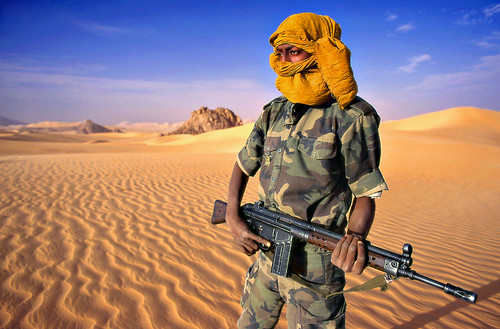 If you missed "The Age of Stupid" -- or if you did see it and still have some appetite remaining for thinking about the future -- then try having a listen to the radio documentary podcast "Climate Wars". It's an interesting and thoughtful look at the future of the planet, focusing on the geopolitical consequences of climate change. I'll give you fair warning though; while there are some notes of optimism, they are few and far between.
If you missed "The Age of Stupid" -- or if you did see it and still have some appetite remaining for thinking about the future -- then try having a listen to the radio documentary podcast "Climate Wars". It's an interesting and thoughtful look at the future of the planet, focusing on the geopolitical consequences of climate change. I'll give you fair warning though; while there are some notes of optimism, they are few and far between.The presenter of the series is Canadian journalist and historian Gwynne Dyer, an expert in international relations and military history. A few years ago, he started to notice that military strategists in several countries were getting increasingly concerned about climate change as a security threat. With the grim humour that is his stock in trade, he notes that the military's scanning for threats is partly a function of the need to justify their existence, so their advice should be taken with a grain of salt: "never ask the barber if you need a haircut." He decided to critically examine whether people might actually go to war over global warming -- and he concludes that we very well might.
Through interviews with experts around the world, he explores how a rise in global average temperature of two or three degrees is likely to result in dramatic shifts in food production and availability of fresh water. These in turn would trigger conflicts over resources and mass migrations of climate refugees. (Indeed, he argues, we are already seeing climate refugees on the move, but we're not calling them that yet.) In the course of writing his book and making this documentary, he says he learned four things:
1. "... a lot of the scientists who study climate change are in a state of suppressed panic these days. Things seem to be moving much faster than their models predicted."
2. "... military strategists are right. Global warming is going to cause wars, because some countries will suffer a lot more than others. That will make dealing with the global problem of climate change a lot harder."
3. "... we are probably not going to meet the deadlines. The world's countries will probably not cut their greenhouse gas emissions enough, in time, to keep the warming from going past 2 degrees celsius. That is very serious."
4. "... it may be possible to cheat on the deadlines. I think we will need a way to cheat, at least for a while, in order to avoid a global disaster."
If we do nothing, Dyer warns, we face a bleak future of famine, war, and fortified borders separating the fortunate few from the desperate many. But he is optimistic that we can avoid the doomsday scenario. The technological parts of the solution are readily available. The real challenge will be forging a global consensus before tensions rise to the point where consensus is no longer possible. "The only really hard of this", he says, "is the politics." He pauses. "The politics. Always the politics."
Listen online here or you can download the podcast in three parts: Part 1, Part 2, and Part 3
- By Brian Lucas
No comments:
Post a Comment